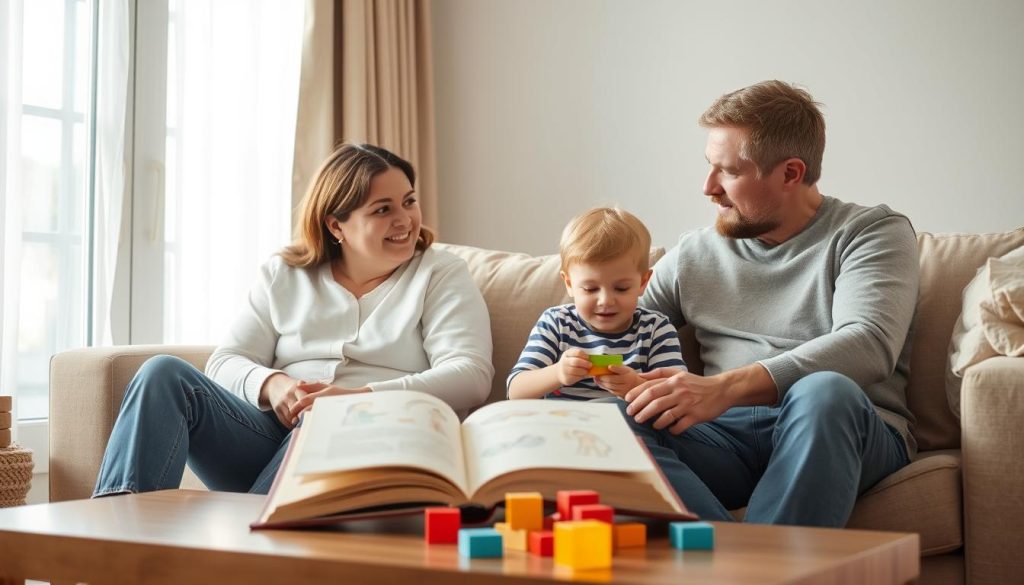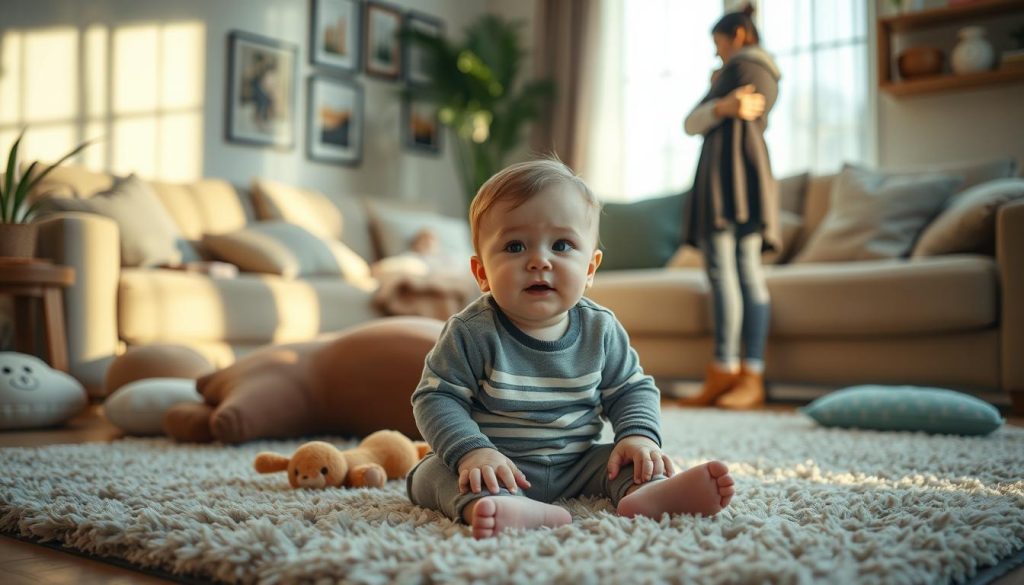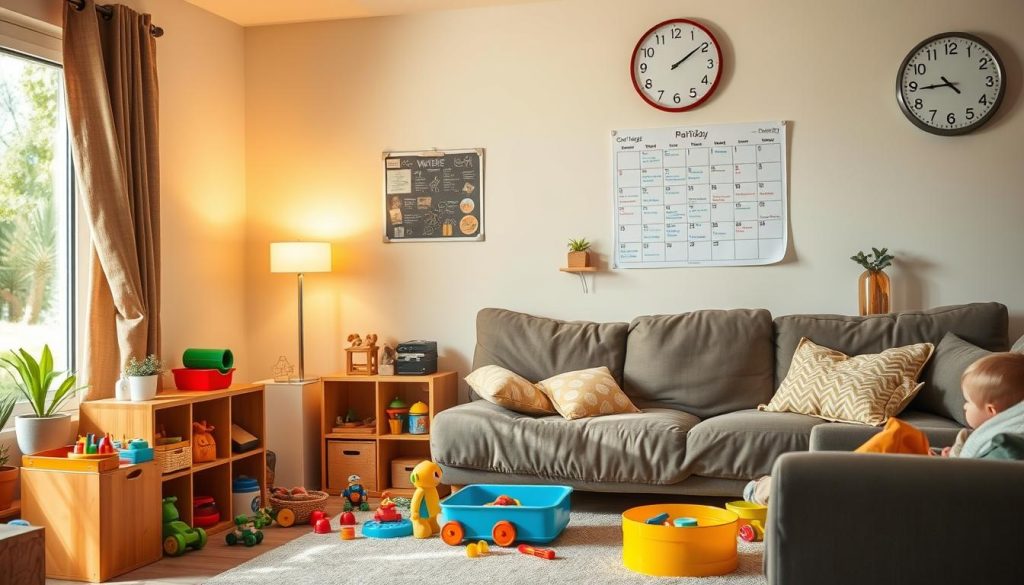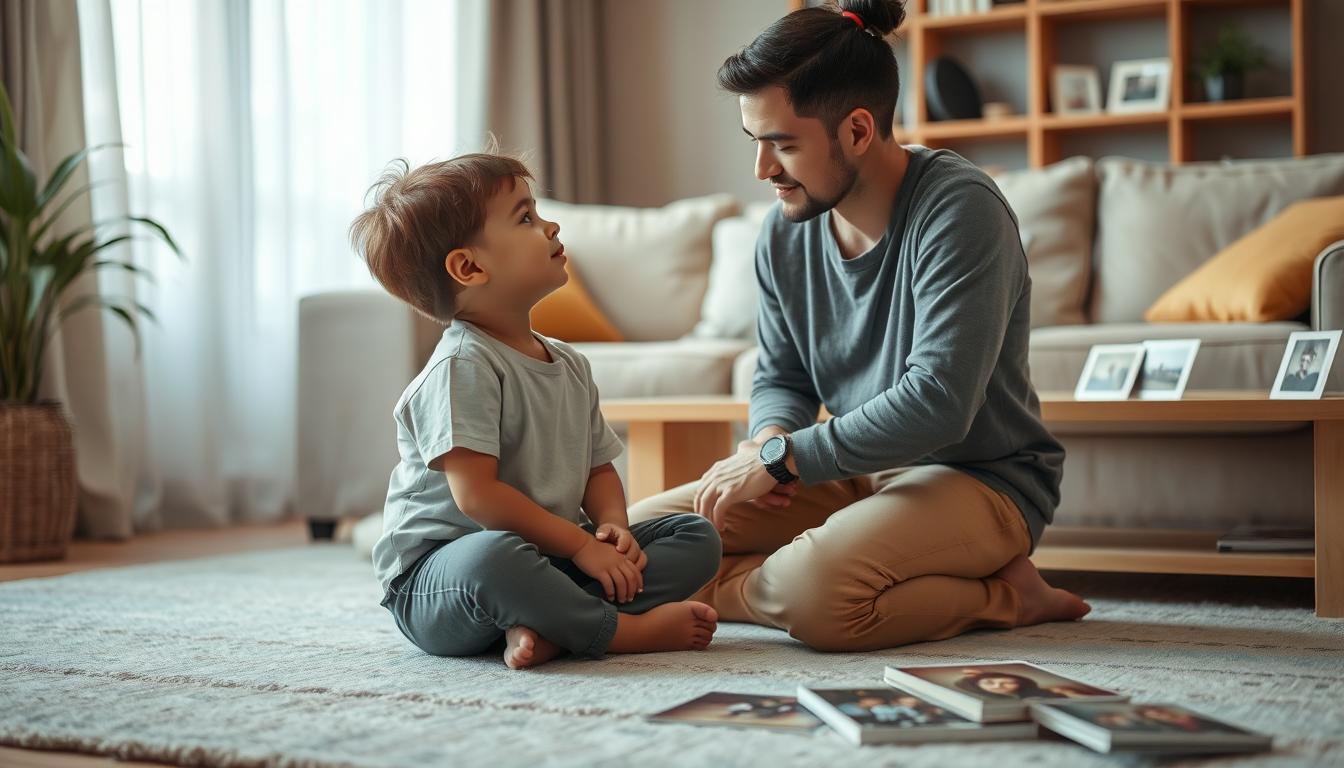Ever thought about how to tell your child about divorce without stressing them out? It’s a tough moment for every parent. Talking about divorce with kids is really hard. They look up to their parents for stability, making this talk very important for a good start.
Psychologist Jamie Howard from the Child Mind Institute says how you share this news matters a lot. Being prepared, clear, and supportive is key when discussing divorce with kids. This article will help you explain the divorce process to your kids smoothly, keeping their emotional well-being in mind.
Key Takeaways
- Discussing divorce with your child in a calm and unified manner is crucial for their emotional well-being.
- Parents should plan what to say ahead of time to avoid conflicts during the conversation.
- Reassuring your child that the divorce is not their fault helps alleviate feelings of guilt.
- Providing clear answers to immediate concerns can help your child feel more secure.
- Maintaining a supportive and consistent approach ensures your child feels loved and confident.
Preparing for the Conversation
Getting ready to talk about divorce with your child is crucial. It’s about understanding the big impact this chat will have. And how to talk about it in a way that’s gentle and caring.

Planning What to Say
Think about what you need to say before you start. It’s important to be on the same page and use secure parenting methods. Choose a story that’s easy to understand and true, without pointing fingers.
Child psychologist Jamie Howard says it’s best to talk together. This shows that your roles as parents are still strong. It helps keep your family’s foundation solid.
Choosing the Right Time and Setting
Finding the right time and place is key. Pick a spot where you can talk privately and without interruptions. This lets your child absorb the news calmly.
A quiet, safe place helps for a better conversation. It also helps you and your co-parenting partner work together better. These tips help ease the immediate shock and set a good example for the future.
Explaining the Situation Clearly
When talking about divorce with your child, being clear is key. It’s important to help them understand the changes without feeling too much. A clear and thoughtful way to explain things helps them adjust better.
Using a Non-Blaming Narrative
Using non-blaming language is very important. Try not to blame anyone during these talks. Explain that the decision to divorce came from the parents’ conflict. This way, your child won’t feel guilty or confused.
For example, you could say, “Sometimes, even though two people care about each other, they choose to live apart to be happier.”

Avoiding Overwhelm with Details
Don’t share too many details with your child. They might ask questions, but too much info can stress them out. Give them enough to understand what’s happening without getting into the details of the conflict.
Let them ask questions and answer truthfully. But keep your answers simple and suitable for their age. This helps them feel secure and loved, even with the changes.
Reassuring Your Child
After a divorce, making your child feel secure is key. It’s not just about giving them a quick hug. It’s about building a strong, lasting support system as your family adjusts.
Expressing Unconditional Love
Telling your kids you love them no matter what is vital. Let them know your love doesn’t change, even when things do. This reassures them that they are still safe and loved, no matter what.
It’s important to keep saying that, even if things change, your commitment to them doesn’t. This helps them feel secure and loved, even when things are different.
Establishing Future Stability
It’s important to talk about what the future holds for your child. Explain any changes they might see and reassure them you’ll be there to support them. This includes how you’ll handle relationships with step-siblings, making sure they feel included.
Research shows 62% of parents focus on reassuring without solving problems. But 80% of kids feel stronger when they solve their own problems. Talking about problems and reassuring them together helps them feel secure and strong.
Managing Their Emotional Reactions
Handling a child’s feelings after a divorce can be tough. Kids might feel sad, angry, guilty, or even relieved. It’s key to be ready for these feelings and offer emotional support for kids by paying attention to their emotions.

Listening and Acknowledging Feelings
Listening well and acknowledging child feelings is very helpful. This means making eye contact, nodding, and saying back what your child says to show you get it. Kids who feel secure with their parents tend to handle their feelings better.
Encourage your child to share their feelings. Say things like, “It’s okay to feel sad” or “I understand why you feel this way.” This helps them feel heard and understood.
Encouraging Open Communication
It’s also important to encourage open dialogue. Make a safe space for your child to talk about their divorce feelings. This helps them process their emotions and know they’re not to blame.
Studies show kids do better when parents talk openly and calmly. As part of parenting after divorce, tell your child their feelings are okay. Also, talk about how changes in daily life might affect them. This helps them deal with their emotions.
Providing Consistency and Routine
After a divorce, keeping a steady routine is key for kids. It makes them feel safe and know what’s coming. This is vital for their emotional well-being.

Maintaining Daily Routines
Sticking to routines like meal times and bedtime helps a lot. It gives kids a sense of stability. This is good for their social and emotional growth.
When routines change, using pictures and positive feedback helps. It makes kids feel part of the family and boosts their confidence. This helps them adjust to the new family setup.
Coordinating with the Other Parent
It’s crucial for parents to agree on routines and rules. This avoids confusion and stress for kids. It’s especially important for middle children who might feel it more.
Having family meetings where kids help set rules is helpful. It makes them more likely to follow the rules. Being flexible but consistent helps kids adapt to new situations.
Addressing Parenting Challenges
Parenting after a divorce can be tough. It means changing how you share custody and how your family works together. It’s important to keep things stable and clear for everyone.
Handling Custody and Living Arrangements
When kids are involved in a divorce, figuring out custody is key. You need to think about what’s best for the child. It’s important to talk openly about the changes they’ll see.
Let them know that both parents will still be involved, even if they don’t live together. This helps kids understand their new situation.
Managing Co-Parenting Dynamics
Co-parenting well is crucial after a divorce. Parents should work together to create a supportive space. This means setting clear rules and being consistent in both homes.
Talking about tough topics, like talking to kids about puberty, is also important. Being open helps reduce stress and supports healthy growth.
Also, showing kids how to handle conflicts is important. This teaches them how to build strong relationships. By working together, parents can help their kids through tough times.
Seeking Professional Help and Resources
Divorce can be tough, especially for kids. But, there are many resources to help. Getting online family therapy and joining support groups for divorced families can really help. Also, books and other educational resources for parenting can guide your family through this tough time.
Online Family Therapy and Support Groups
Online family therapy is a flexible and easy way for families to get help. It can tackle many issues, like helping kids with anxiety. A Harris poll shows many parents worry about young people’s mental health. Online therapy can be a big help.
Support groups for divorced families offer a network of understanding. They make it easier for parents and kids to deal with divorce.
Utilizing Books and Educational Materials
Books and educational resources for parenting help start tough conversations about divorce. They comfort kids, showing them they’re not alone. These resources are key in helping kids with anxiety and other feelings.
They give parents the tools to support their kids better. This makes the transition smoother during a hard time.
Conclusion
Dealing with divorce and its effects on your child can be tough. Keeping communication open and showing love helps a lot. This guide offers tips to make this tough time easier for your child.
Keeping routines and being positive is very important. It helps with things like budgeting and screen time. It also teaches kids to care for the environment.
Research shows that when both parents work together, kids do better emotionally. It’s also key to talk about social media and sibling rivalry. The goal is to help your child grow strong and handle tough times.
Using resources like sports coaching or talking about drugs is helpful. It supports your family during this time.
FAQ
How should parents plan what to say when discussing divorce with their child?
What is the ideal time and setting for talking to kids about divorce?
How can parents use a non-blaming narrative when explaining a divorce to their children?
Why is it important to avoid overwhelming children with details about the divorce?
How can parents express unconditional love during the discussion about divorce?
What are effective ways to establish future stability for your child after divorce?
How should parents manage their child’s emotional reactions to divorce?
Why is encouraging open communication with children about divorce important?
How can maintaining daily routines help children adjust to divorce?
What should parents consider when coordinating with the other parent post-divorce?
How should parents handle custody and living arrangements discussions with children?
What are some strategies for managing co-parenting dynamics after a divorce?
How can online family therapy and support groups benefit families during a divorce?
What types of books and educational materials can help children understand and cope with divorce?
This post contains affiliate links. If you click on a link and make a purchase, I may earn a small commission — at no extra cost to you. Thank you for supporting this blog and helping me keep the patterns free! Read the full Affiliate Disclosure & Transparency.
